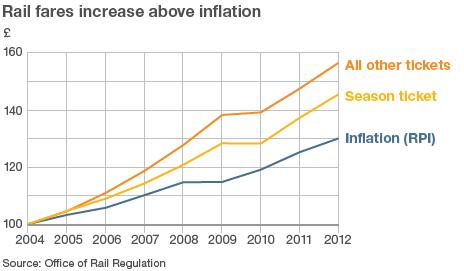Rail fare hike of 6.2% sparks angry reaction
- Published
Commuters tell tales of rail fare woe
Passenger groups have led a chorus of protests against the 6.2% hike in some rail fares in England - an increase almost double the rate of inflation.
The Retail Prices Index (RPI), which rose to 3.2% in July, is used to calculate rail fare rises.
Some English fares will rise by RPI plus 3%, while in Scotland they will go up by RPI plus 1%. Wales has yet to set a figure.
Passenger groups and some ministers said the increase was too steep.
"This is another inflation-busting increase - there is only so much you can squeeze passengers," said Mike Hewitson from watchdog Passenger Focus.
"The government needs to think again about the plus 3% [formula]."
Campaign for Better Transport said rail fares could rise three times faster than salaries if the government sticks to its policy.
The group said commuters across the country routinely spend between 5% and 10% of their salary getting to work. In some towns in south-east England, it said they spent up to 15%.
Shadow transport secretary Maria Eagle said: "This is a government that puts the wrong people first.
"David Cameron's decision to side with the powerful private train operators against commuters and passengers shows he is desperately out of touch with the cost-of-living crisis facing many hard-working families."
The move was also criticised by Liberal Democrat MP Julian Huppert, who chairs his party's transport committee.
"Britain has the most expensive railway network in Europe. Astonishingly, they want to raise fares above inflation," he said.
"The coalition is, quite rightly, investing more in our railways. But we can't just pass on the cost to the consumers."
'Necessary'
But Transport Secretary Theresa Villiers said that the fare increases were necessary in the short-term to achieve the government's long-term goal of bringing down the cost of running railways.
"In the longer term we are determined to get rid of these above-inflation fare rises all together," she said.

"But in the meantime I'm afraid these fare rises are going to be necessary in order to help us deliver a rail investment programme at a time when the deficit means public spending needs to be constrained," she added.
Michael Roberts, chief executive of the Association of Train Operating Companies, said: "It has been government policy during the past eight years for passengers to pay a larger share of the cost of operating the railways and to focus taxpayers' money on investing in longer-term improvements to the network.
"Any flexibility train companies have within the rules is to maximise revenue for the government."
BBC transport correspondent Richard Westcott says passengers and taxpayers used to split the cost of running the railways, with both sides paying about half each, but successive ministers have cut the amount of government funding and that has resulted in regular fare rises.
Unfortunate
The RPI measure of inflation has fallen consistently since September last year, from a high of 5.6%.
In June, it stood at 2.8%, and many analysts expected the rate to fall further in July.
But the increase to 3.2% has come at an unfortunate time for rail users, who will suffer higher ticket prices come January.
The figures for planned rises in England and Scotland are an average across regulated tickets, which make up half of all fares.
These regulated fares include season tickets and off-peak intercity journeys. In Scotland, this does not include the busy shuttle service between Edinburgh and Glasgow.
Some passengers could see their journey prices rising by more than the average, as train companies are allowed to increase them by up to five percentage points more, as long as they cut ticket prices elsewhere.
Passengers will not be told yet how prices will change on their specific route. The latest figure sets the template for this rise.
Those who travel across a border, such as from Scotland to England, will be subject to the higher English fare rises.
There are no fare increases currently planned in Northern Ireland, where fares are not linked to RPI, after a 3% rise in April.
The official inflation figures from the Official for National Statistics show that the Consumer Prices Index measure of inflation rose from 2.4% in June to 2.6% in July. The rise in the rate of CPI follows three months of falls.
- Published6 January 2012
- Published16 July 2012
- Published21 June 2012